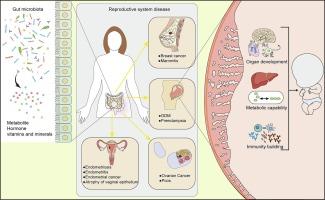The gut-reproductive axis: Bridging microbiota balances to reproductive health and fetal development
IF 4.8
2区 医学
Q2 IMMUNOLOGY
引用次数: 0
Abstract
The gut microbiota is a highly complex microbial community residing in the digestive tract of humans and animals, closely linked to host health. Dysbiosis within the gut microbiota has been associated with various diseases. Moreover, it interacts with the female reproductive system’s microbiota, influencing maternal reproductive homeostasis. Although the gut microbiota holds potential for treating reproductive system diseases and modulating offspring fertility, research in this domain remains limited. This review examines the relationship between both balanced and imbalanced gut microbiota and reproductive system diseases, as well as their effects on fetal development. It is highlighted that dysbiosis in the gut microbiota may contribute to several reproductive conditions, including polycystic ovary syndrome (PCOS), preeclampsia (PE), endometriosis, gestational diabetes, and reproductive cancers. The abundance of specific gut microbial species or interactions among various species can influence the reproductive system through hormonal pathways and other mechanisms, ultimately affecting pregnancy outcomes and fetal health. Therefore, the concept of the gut-reproductive axis is proposed, emphasizing the significant role of maternal gut microbiota in shaping fetal development, metabolic capacity, and immunity.

肠道-生殖轴:将微生物群平衡与生殖健康和胎儿发育联系起来。
肠道微生物群是居住在人类和动物消化道中的高度复杂的微生物群落,与宿主的健康密切相关。肠道微生物群的菌群失调与多种疾病相关。此外,肠道微生物群还与女性生殖系统的微生物群相互作用,影响母体的生殖平衡。虽然肠道微生物群具有治疗生殖系统疾病和调节后代生育能力的潜力,但这方面的研究仍然有限。本综述探讨了平衡和失衡的肠道微生物群与生殖系统疾病之间的关系,以及它们对胎儿发育的影响。综述强调,肠道微生物群失调可能会导致多种生殖系统疾病,包括多囊卵巢综合征(PCOS)、子痫前期(PE)、子宫内膜异位症、妊娠糖尿病和生殖系统癌症。特定肠道微生物物种的丰度或不同物种之间的相互作用可通过激素途径和其他机制影响生殖系统,最终影响妊娠结局和胎儿健康。因此,我们提出了肠道-生殖轴的概念,强调母体肠道微生物群在塑造胎儿发育、代谢能力和免疫力方面的重要作用。
本文章由计算机程序翻译,如有差异,请以英文原文为准。
求助全文
约1分钟内获得全文
求助全文
来源期刊
CiteScore
8.40
自引率
3.60%
发文量
935
审稿时长
53 days
期刊介绍:
International Immunopharmacology is the primary vehicle for the publication of original research papers pertinent to the overlapping areas of immunology, pharmacology, cytokine biology, immunotherapy, immunopathology and immunotoxicology. Review articles that encompass these subjects are also welcome.
The subject material appropriate for submission includes:
• Clinical studies employing immunotherapy of any type including the use of: bacterial and chemical agents; thymic hormones, interferon, lymphokines, etc., in transplantation and diseases such as cancer, immunodeficiency, chronic infection and allergic, inflammatory or autoimmune disorders.
• Studies on the mechanisms of action of these agents for specific parameters of immune competence as well as the overall clinical state.
• Pre-clinical animal studies and in vitro studies on mechanisms of action with immunopotentiators, immunomodulators, immunoadjuvants and other pharmacological agents active on cells participating in immune or allergic responses.
• Pharmacological compounds, microbial products and toxicological agents that affect the lymphoid system, and their mechanisms of action.
• Agents that activate genes or modify transcription and translation within the immune response.
• Substances activated, generated, or released through immunologic or related pathways that are pharmacologically active.
• Production, function and regulation of cytokines and their receptors.
• Classical pharmacological studies on the effects of chemokines and bioactive factors released during immunological reactions.

 求助内容:
求助内容: 应助结果提醒方式:
应助结果提醒方式:


